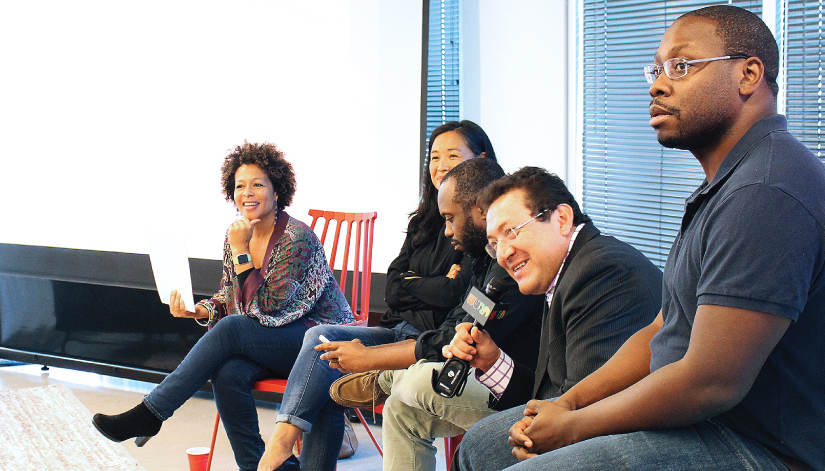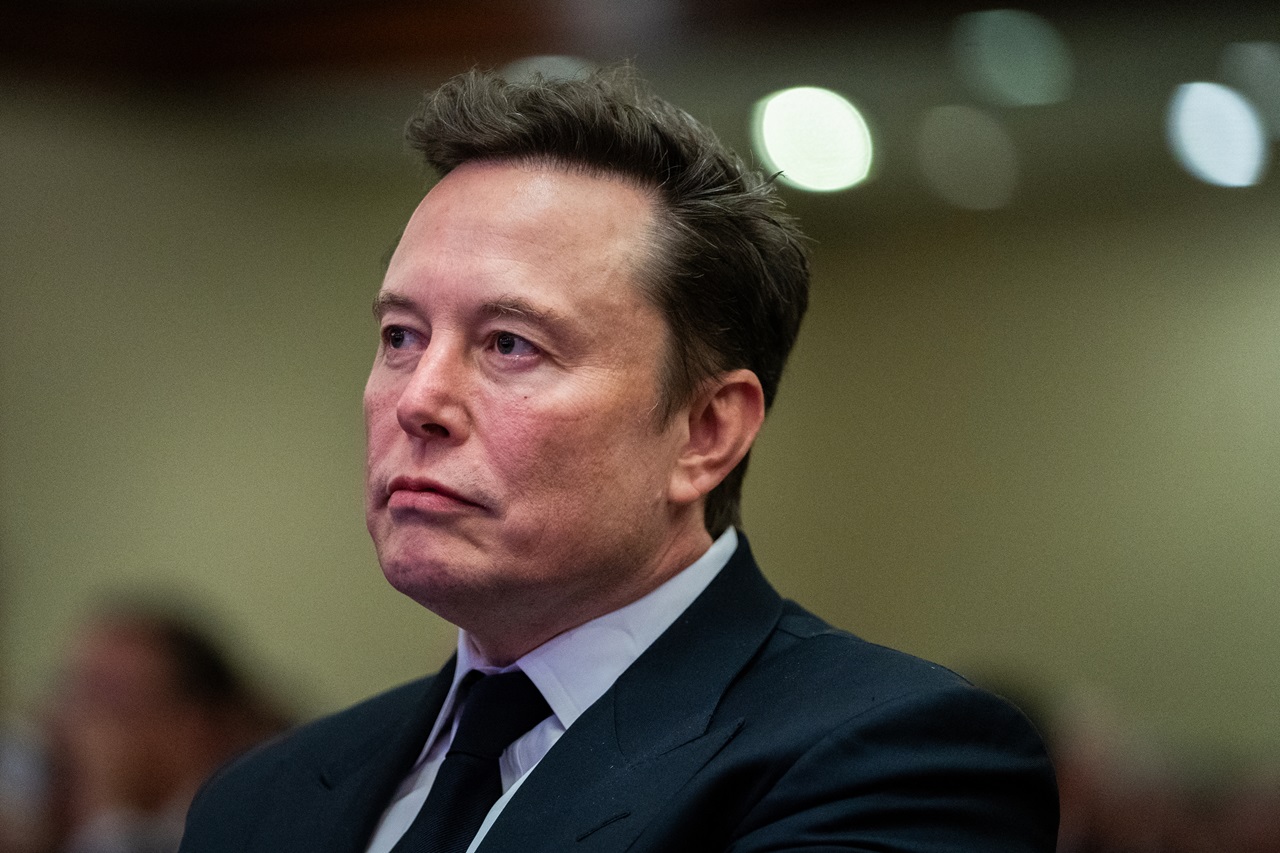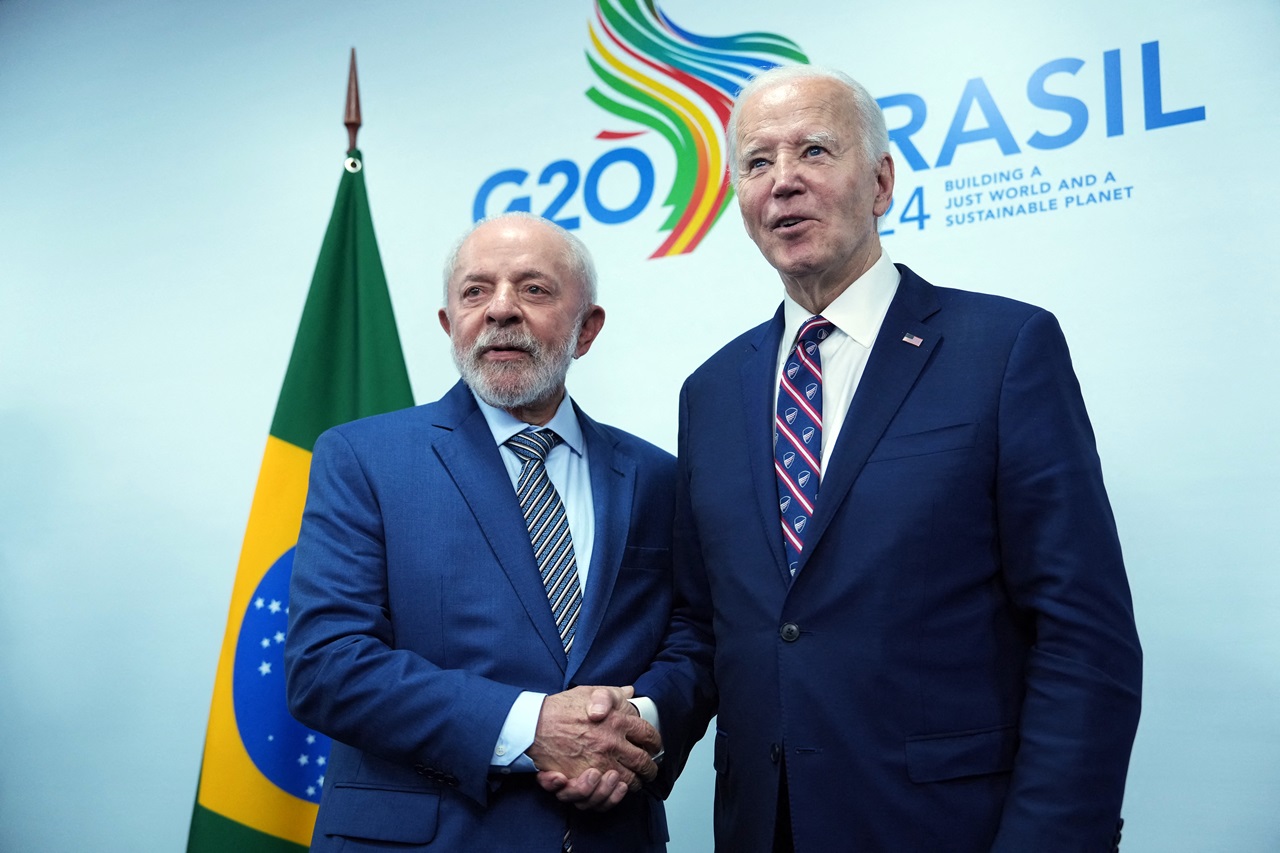
For African Americans and Latinos in Philly, an unprecedented collaboration
Under the guiding vision of the dynamic Sara Lomax-Reese, three organizations come together as The Next Majority, using music and cultural connection to foster…
 It took shape in a Zumba class.
It took shape in a Zumba class.
There, Sara Lomax-Reese, the president and general manager of WURD Radio — listening to the beat and rhythms of music rooted in a common heritage — understood that music was a strong connection between African American and Latino communities nationwide, but especially in Philadelphia. And that it could be used to challenge civic disenfranchisement and foster political participation in both communities.
Lomax-Reese had already chatted — on the same day, but separately and informally — with the publisher of AL DÍA, Hernán Guaracao, and the principals of Little Giant Creative, Tayyib Smith and Meegan Denenberg, about Black and Latino participation in the 2016 Democratic National Convention, which, it had just been announced, would take place in Philadelphia.
“We talked about the fact that Black and Latino communities needed to be a pivotal part of this convention since collectively we make up the majority of Philadelphia’s population – and nationally the demographics are shifting dramatically,” Lomax-Reese said. “We felt like a partnership between WURD, the only Black talk radio station in Pennsylvania, and AL DIA News Media, the leading Latino media outlet in the region, could be really powerful to promote ongoing dialogue about civic engagement and political participation.”
“Later that day I went to a Zumba class and as I was listening to the music, I said to myself, ‘music is the connector and unifier between our communities.’ So I thought that we should use music as an entry point to discuss our shared concerns, challenges and aspirations,” she added.
What would ultimately become The Next Majority (TNM) was born of Lomax-Reese’s thinking that day, and of the unprecedented collaboration she then forged between WURD, AL DÍA and Little Giant Creative.
“The Next Majority will use music and the arts to bridge the gap between the African American and Latino communities in Philadelphia and surrounding areas, thereby creating an exploration of the Afro-Latino experience,” she said.
“Leading up to the Democratic National Convention in 2016, TNM will bring awareness to important issues such as voting and civic engagement in an effort to affect positive change. To create cultural engagement within the African American and Latino communities, TNM will partner with some of the City’s leading music venues like The Kimmel Center, The Painted Bride, and Annenberg Center for the Performing Arts to co-host talk backs and panel discussions in association with their Afro-Latino musical offerings. TNM will host block parties and street festivals within various neighborhoods around the city featuring musical artists from various genres to promote unity and self expression.”
And beyond these, there are plans for multimedia programs that span radio, print and digital platforms. As well as social media and community outreach effected in ways only a truly multicultural, multilingual and innovative collaboration can offer.

Collaboration is key
WURD is the only Black talk radio station in Pennsylvania and one of a few in the nation committed to creating original content specific to the African-American community on a daily basis, according to Lomax-Reese.
“In today’s media market where a handful of huge, multibillion dollar corporations control the majority of what we see, hear, and read, being an independent voice is unique, powerful and important. Over our 12 years of serving Philadelphia, we have created a loyal, engaged, activist audience.
“Because (TNM is) focused on activating Black and Latino communities, WURD and AL DIA are natural partners to create culturally relevant content and ongoing conversation,” she continued. “Little Giant has extensive experience activating younger audiences through music and art so they are a powerful partner to help us create our branding, design and digital outreach. And our most recent partner, Jon Gosier, is a data scientist who will be instrumental in helping us develop an open data portal to track cultural data sets related to Black and Latino communities.”
The invitation to collaborate benefitted from Lomax-Reese’s charismatic and personally engaging personality, and her reputation as a Philadelphia mover and shaker.
“Donna Frisby Greenwood (formerly of the Knight Foundation, now the first president and CEO of the Fund for the School District of Philadelphia), a good friend of Little Giant, encouraged the introduction,” Denenberg said. And for Little Giant, whose eight-year-old agency specializes in marketing, promotions and strategic communications to multicultural audiences, TNM’s “concept of people of color being the country’s minority majority within the next few decades, and the objective of empowering and reflecting that” was a good fit.
Denenberg, an Asian-American Jewish woman, and Smith, an African American man, understand what it’s like to be in the “minority” — which has led Little Giant to explore how to create “truly integrated ecosystems” focused on collective wellbeing and meaningful communication in partnership.
“When the preliminary concept of music being the universal connector for an initiative among the three organizations was brought to the table, it all felt right,” Denenberg added. “It seemed to the natural evolution of all of Little Giant’s capabilities and passions.”
For his part, Guaracao jokes that Latinos never say no to an invitation.
“Seriously speaking, I believe Latinos are always ready to embrace others,” he said. “We are so happy to respond to an invitation from our sometimes distant neighbors — the invitation we long for, the one that is rarely extended to Latinos who often live ostracized in our city. At several levels, Philadelphia feels to the Latino soul like a modern Jerusalem —divided into separate quarters. We frankly don't enjoy it. It's against our cultural DNA.”
“This is the paradox,” he added, “seemingly, we Latinos don't fit anywhere (Are we white? Are we Black? Are we Asian?), but paradoxically, we fit everywhere because we are all of the above. You’ll find Latinos everywhere, in almost every corner of the city, inclined to connection and resisting the idea that we must be confined to our designated neighborhoods. When Sara came to me and said, ‘Let's Zumba!’, let's work to bring our communities together on the foundation of music and on important concerns like politics, it immediately sounded to me like a great party to be part of....”
“AL DIA was a start-up born in the most impoverished area of our city in 1991, and we are now, in 2015, a presence in the most prestigious business corridor in downtown Philadelphia. It has been an arduous journey. We fully understand our responsibility as the premier news media organization focused on the Latino experience, and we have earned and re-earned our place in the community and the city with every year of the 23 years of uninterrupted work we’ve put in,” Guaracao said.

Hernán Guaracao of AL DÍA News Media. (Photo: Yesid Vargas/ AL DÍA News)
Made in Philly, but reflecting the nation
A recent Pew Research Center projection calculates that by 2065 no single racial or ethnic group will constitute the majority population of our nation. The non-Hispanic white population, currently 62 percent of the population, will then be about 46 percent of the population, and “the projected demographic changes would produce a rising share of non-white potential voters.”
Informed by national demographic trends and voter engagement challenges, The Next Majority initiative is, nevertheless, a vision rooted solidly in Philadelphia.
“I love Philly,” Lomax-Reese said. “My father grew up in South Philly; my mother in West. I was born here, raised outside of the city and now, through my work at WURD, am deeply committed to the future growth and evolution of this city. I think Philly, like many major U.S. cities, is in a state of transformation — which has its positives and negatives. We are the largest major city with the highest poverty level, which is nothing to brag about.“
“But I think we have the opportunity to learn from Washington D.C., Detroit, New York City and to do something different in Philly to make sure that it remains a socio-economically diverse city, where Philadelphians can grow and prosper and don’t get gentrified out like these other major cities,” she added. “I think a big part of that is empowering Black and Latino communities. And that is what The Next Majority is all about: activating communities of color so our demographic power is fully realized, influencing the political process, creating more economic opportunities and improving the quality of our communities.”
Guaracao said that Philadelphia is “rapidly transforming itself into one of the most diverse cities in America, with Latinos at the center driving our demographic rebound.Culturally, this has the potential to be a catalyst for change and to be an important part of what will help Philadelphia come together and be the global city William Penn's experiment promised more than 200 years ago.”
Denenberg, too, draws on the city’s history to explain why The Next Majority was born here, but doesn’t rule it out as a potential template for Next Majority initiatives across the nation.
“Philly is the birth place of democracy (in the U.S.) and has been a center of innovation for centuries, we believe there is no better place to make change to our political system and to galvanize a new generation of leaders,” she said. “It’s also a clear indication of the future, with its demographic landscape. The transpiring actions and results (of TNM) will, to some extent — and with full understanding that all cities are not mirrors of each other — provide an excellent basis for expansion.”
Moving the needle
In the perfect world, what would this unprecedented collaboration, this Next Majority, accomplish?
“It is critical to begin to increase voter engagement and political participation in these communities in order to make sure our voices are heard and our issues are addressed,” Lomax-Reese said. “So we want to increase voter participation and civic engagement at all levels — from block captains to national elections. One measurable outcome would be to increase voter registration and turnout in future elections.”
But she — and The Next Majority — is prepared to keep going long after the next couple of electoral cycles.
“To really have an impact, we recognize that The Next Majority is a long-term process,” Lomax- Reese said. “The issues that confront Black and Latino communities around voter engagement (or apathy) are deeply rooted in systemic problems facing our nation — poverty, underfunded public education, immigration policies, criminal justice inequities, etc.
“So we’re in it for the long haul,” she concluded. “We recognize that we have to have authentic neighborhood engagement at many levels — through our media outreach, community events, social media, personal interaction — in order to move the needle.”










LEAVE A COMMENT:
Join the discussion! Leave a comment.